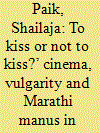| Srl | Item |
| 1 |
ID:
186838


|
|
|
|
|
| Summary/Abstract |
Sexuality has always been a closely guarded subject in both Christianity and African Traditional Religions (ATRs), and regarded as a sensitive topic unfit for public discussion. In Zimbabwe, there is an emerging trend of sex gospel in Pentecostal Christianity. This has stirred mixed feelings among Christians and ATR adherents. Deploying the religion and social transformation perspective, this netnographic study of Christopher Kapandura of ZAOGA (FIFMI) and Lucia Gunguwo of Eternal Word Ministries’ sermons, explores the eccentric development and argues that sex gospel is inevitable. It is a positive response to social transformation. However, this topical issue grapples with challenges of dissemination methods in the broad public space. The study shows preachers’ creativity and innovation in brand formation in a highly competitive religious market. This is a timely contribution to the meagre scholarship on sex gospel in Pentecostal Christianity, especially its relevance in the context of social change.
|
|
|
|
|
|
|
|
|
|
|
|
|
|
|
|
| 2 |
ID:
190723


|
|
|
|
|
| Summary/Abstract |
Critiques of vulgarity, sexuality and class featured prominently in the social, cultural and intellectual life of post-Independence India. This article focuses on the discourse of chumban bandi (banning kissing) in the 1950s and 1960s Maharashtra and analyses how it became a particularly unique index of heightened transgressive pleasure. I situate this discourse within a larger public debate, where dominant caste middle-class elites took upon the responsibility to shepherd supposedly recalcitrant dominated castes and low-class masses towards decency, civilized action and citizenship. Many elites energetically worked on their ideology, which was rooted in high-caste, middle-class and patriarchal values to create Marathi manus and nation. Drawing upon hitherto neglected Marathi language texts, I show how elites policed the kiss to both ban on-screen kissing and paradoxically harness its energy to engage in the politics of Marathikaran (creating Marathi regional identity) and create a new Marathi identity as modern, moral and decent.
|
|
|
|
|
|
|
|
|
|
|
|
|
|
|
|